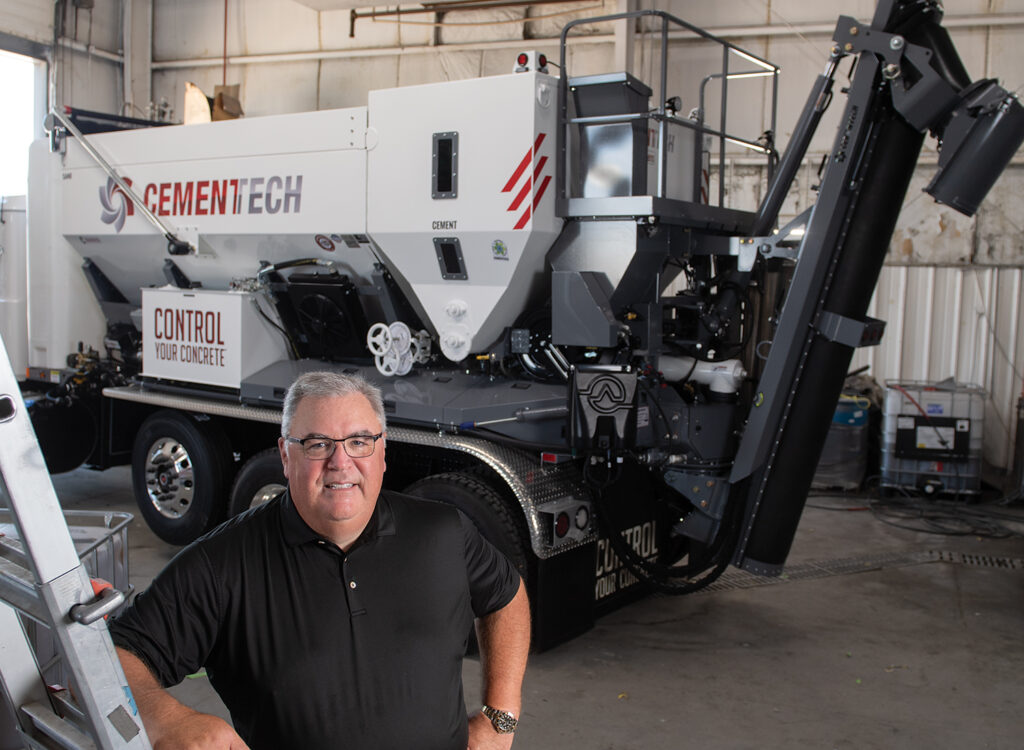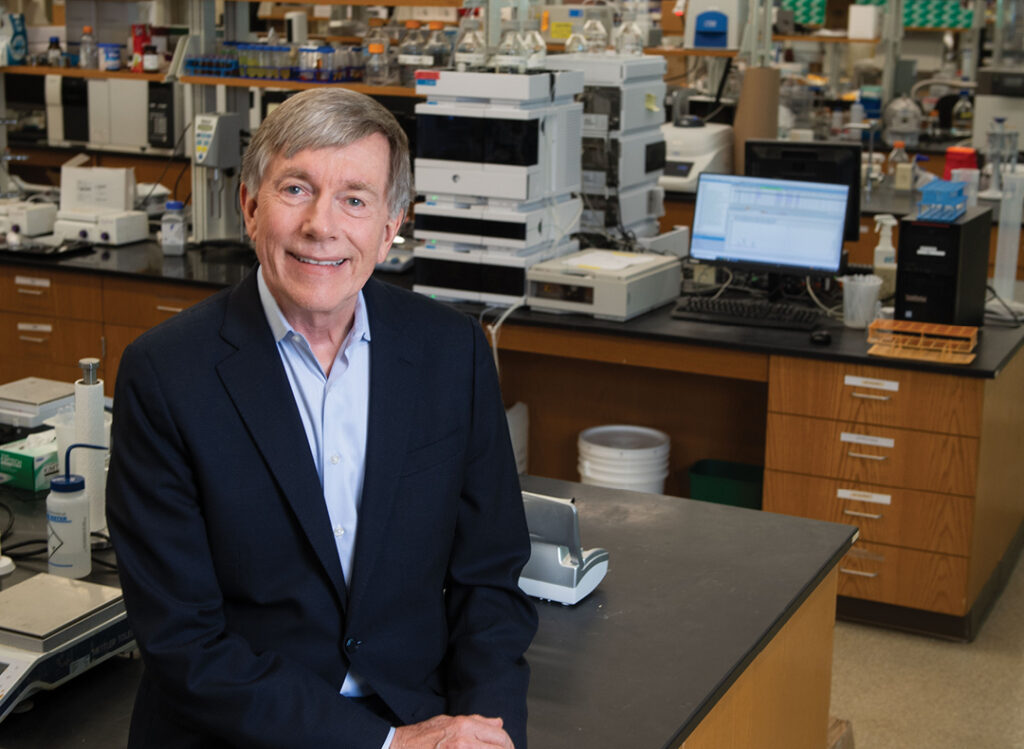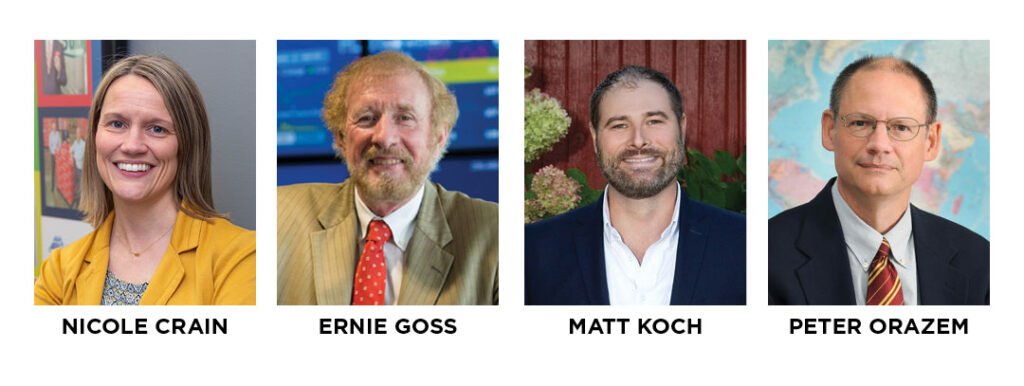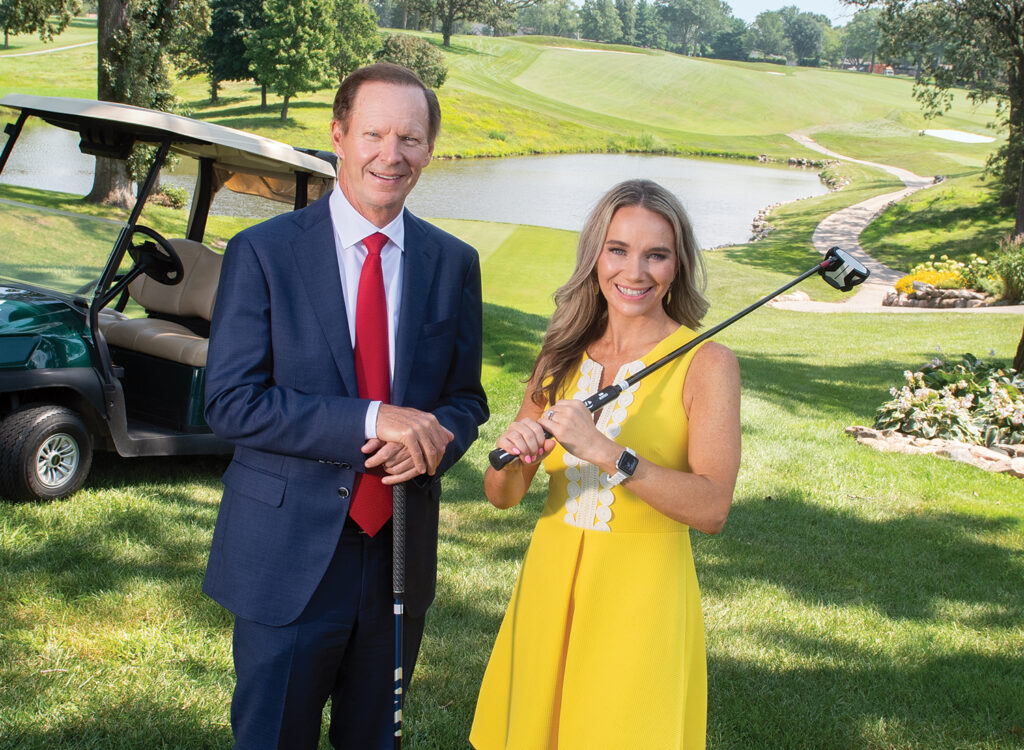Closer Look: Adam Hammes
Executive director, Iowa Sustainability Business Forum

One year after reviving Green Drinks-Des Moines, author, speaker and sustainability consultant Adam Hammes believes the group, which meets once a month at Peace Tree Brewery in Des Moines, is on a roll.
“We want people to just show up, because we’re convinced that they’ll have a good time and they’ll learn new things,” Hammes said.
An extra incentive: Green Drinks-Des Moines gives away 15 free drink tickets at the beginning of each session, and Peace Tree Brewery offers $1 off all draws at the bar for participants of Green Drinks.
Hammes is a believer in pointing out incentives for sustainability efforts.
He is the author of both “Sustainable Business in Iowa: How Leading Companies Profit From Environmental and Social Responsibility” and “Stress-Free Sustainability: Leverage Your Emotions, Avoid Burnout and Influence Anyone.” Hammes also is the former manager of sustainability for Kum & Go, founded the nonprofit Urban Ambassadors in 2008, and is the founder and executive director of the Iowa Sustainable Business Forum, founded in 2014.
At least one Thursday a month, you’ll find him at Peace Tree on East Court Avenue, welcoming the two featured speakers behind the taproom’s barrel installation.
What led you to rebuilding the Des Moines chapter of Green Drinks?
I’ve lived in Des Moines for 11 years now, and there was a group that was active in the past. It was smaller, and I had been a part of some other cities’ — Green Drinks is an international movement — and there were different folks who would try to look at how can we … get more people involved in Green Drinks and grow it. The people who ran it did a really great job, [but] at some point in time, it kind of fizzled out. That’s common for places [in Iowa], I’ve looked at other cities and it looks like they have one, but it’s not actually active.
I just remember reaching out after a while and saying, “What’s happened with Green Drinks? Does anybody have the old email list?” … I didn’t want to re-create the wheel and have it burn another group out who’s managing it. So I took some time to try to find some partners and say, “How can we make this easier, bigger and ongoing, more sustainable as an event?” So [I] partnered with Urban Ambassadors, a local nonprofit, and … Silent Rivers Design + Build.
Silent Rivers is a sustainable construction company; they focus on sustainable design. They’re really giving us money for sponsorships, to help offer free drinks to the first 15 people. … Partnering with Peace Tree Brewing to make sure they give us a good space that was always available, and had a good TV screen that we can present good speakers. It became finding the right partners, and Peace Tree Brewing was the right location, Silent Rivers was the right sponsor, Urban Ambassadors was the right kind of marketing partner. … They’re really on the community side of finding speakers. They know a lot of community speakers.
As part of the Iowa Sustainable Business Forum, I wanted to have a balance of business speakers. So we all talked about what we wanted the event to do for Des Moines. It was really the mission [to] create more connections, bring different groups of sustainability people together.
We don’t just have people come and talk about a problem, because it seems like a negative when you’re just saying “this is wrong, this is wrong.” We want people to show up. They’ll learn about the problem through the solution. … We want them to start doing something immediately.
The monthly Green Drinks events feature two speakers an evening. How are those speakers chosen?
Over coffee at Mars Cafe with Urban Ambassadors and Silent Rivers. … We get together and we all have ideas, but we also kind of push each other.
It’s my role to reach out and get the business speaker. Urban Ambassadors and Tanner [Faaborg], he’ll say, “Here’s a bunch of great organizations.” … We try to push each other and say, “Hey, we haven’t had a good community speaker on transportation lately, we haven’t had a good speaker on water quality.”
What makes the Des Moines event different from other Green Drinks events across the state?
We’ve kind of grown this collaborative group that [is] collectively putting on the event, and nobody really owns it, and we don’t make any money off of it. But everyone’s there for a particular reason. I want to promote sustainable businesses that are doing responsible things, so more businesses do that. Urban Ambassadors wants to promote community social and environmental programs, because that’s really who they are – they market those organizations and plug people into the community. … Chaden [Halfhill, CEO of Silent Rivers] wants to help people build green, but he also is a longtime, very active member of the arts and environmental community. He was a part of the old Green Drinks. … Peace Tree wants more people to come in and learn who they are, hold events there and drink their beverages.
All around the country, Green Drinks is a lot of work and you can burn out after a while, because you’re one person or two people [who] try to do this over and over again every month. … We’ve brought a team together to make the load lighter.
Tell us about your role at the Iowa Sustainable Business Forum.
I helped found it when I left Kum & Go in 2014 – I was their manager of sustainability.
We get companies together to share best practices in sustainability with one another, peer-to-peer. It brings down a lot of the barriers to finding out what’s the business case, how can we quickly save energy, save waste, save water, save on transportation, fuel [and] reduce those environmental impacts we have anyway. Oftentimes there’s a way to do it that’s actually better for the company. You can save money, you can make your employees happier, make your customers happier. But a lot of businesses don’t necessarily know what that business case is. When they hear directly from another company in Iowa that’s already done it, they have very few objections. They have more questions about, “How did you do that? How did you do this?” That was what I wanted to create when I left Kum & Go, was to get as many companies in Iowa sharing best practices as possible.
What are the most pressing questions for businesses evaluating their sustainability efforts?
Keeping employees happy, largely because there’s a talent war going on around the country. You could argue that we’re losing, because we’re rural, we’re viewed as a very rural agricultural state that people don’t want to move to, right? So you have to go out of your way to show that you are a socially responsible, environmentally responsible part of that.
A lot of it’s just culture. It’s how much you pay, what your benefits look like, is it a fun place to work, what kind of autonomy do you have in decision-making – are you going to use your talents. … Socially, we’re more concerned in the business community at large.
Environmentally, I think there’s just as much passion but things are cheaper here. If you look up our economic development strategy in Iowa, policy-wise at the state Legislature, it’s to keep things cheap so that companies will move here. They see it’s good people, but also cheap electricity, cheap water … and we do that on purpose. Because not everybody wants to move to Iowa.
It makes it harder for businesses who are already looking to be more efficient to save on energy, save on waste, because our prices are lower than most other places in the country. So the ones who are doing it are actually more progressive than, say, California [companies], because we’re doing it with much less ROI than any other place.
One year after restarting, how is Green Drinks doing? What would you like to see in 2019?
It’s kind of like [being] an entrepreneur: You invite all your family and friends, right, and you want the first one to go really well. We had over 40 people, and it was standing room only in some places. It was very fun, and the concern I had was, is the next one only going to be six people? How do we make sure that it continues to be a successful, well-attended event?
It only dropped down right when it warmed up. … We had 20-some, and I started worrying, thinking, “This is the beginning of the end.” … But then it bumped right back up, and we had 40-ish. We tend to stay right at that number. That’s good, but what’s even better is we usually say, “Who’s here for the first time?” and half the group always raises their hand. So we’re getting new people, new faces by having these diverse speakers, which is nice. What we’re hoping is we’re going to hit this tipping point where people are starting to come back. … Our email list is almost up to 500 people, so if we can get a percentage of those people who start wanting to come every month, we’re going to hit 50 people, 60 people, 70 people.
We don’t really have any big plans to change it, except to just have bigger crowds. If we have bigger crowds, maybe we could add snacks, or maybe we could add more sponsors and things like that. But we really just want to make the event as good as possible. Peace Tree has given us six or seven months’ worth of dates, so we can start marketing future dates to people, which is nice. … What we’re trying to do is just get it running easily and continuously.
Has it changed the way you view the business community since you started this event?
In my job in the association, we create a safe space for businesses to share what is working, but also what isn’t working and what they’d like to improve on. That’s not stuff that you tend to go out in public and talk about.
Many of those members have been very happy to come to a public event with 40 people who are clearly at varying degrees of activists to [those that] don’t really know, just interested in the topic. I wondered if those companies would worry about getting really tough questions, or people who are very opposed to whatever they happen to be doing and had a different opinion. They’ve all been great, and they’ve all answered questions really well, and they’ve all always had to handle “Why do you do this?” sorts of questions. I think they’ve handled it really well, and given their perspectives, “As a company, we believe in this, and here’s how we approach it. This is why we’re trying to solve it.”
I was worried that we might not get as many business speakers as community speakers because [with] community speakers, that’s their job to go out and convince the public, right, about their initiative. … I’ve learned that there’s a lot of great people in those companies who want to share the good things that they’re doing, and really talk honestly about why they’re not doing it a different way.
What have you been reading/watching/listening to lately?
I mean, I read like a nerd.
A friend recommended I read a book called “Fully Alive” [by Tyler Gage]. It’s about the young entrepreneur who founded Runa, an Amazonian tea leaf drink [company]. … It’s just a fascinating story. It has all the environmental stuff, it has the social [aspect], but also really easy to read because it’s the story of an entrepreneur, which I think people latch onto. Things like making agriculture more sustainable. I think that’s really important.








